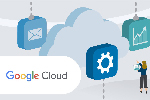Online MS in Digital Transformation
Position yourself at the forefront of the tech revolution with an MSc in Digital Transformation. With 44% of workers' skills estimated to be disrupted in the next five years, now is the time to fast-track your career growth.

Drive Growth and Profitability
Digital transformation is crucial for business efficiency and innovation. Organizations that successfully digitize operations increase more than just productivity. They are also more profitable. If you are ready to lead this work across your organization the MSDT is the key to getting your seat at the table.
What's your future worth?
MS in Digital Transformation graduates can expect to increase their salary by up to
40%
Source: businessstudent.com
Unlock Your Professional Potential
An MSc in Digital Transformation will help you be a top candidate for senior leadership positions. With companies spending an estimated $731.13 billion annually to digitize their business operations, there is an urgent need for individuals with the technical expertise and business acumen to lead these transformative initiatives.

What You Will Learn
Lead Collaborative Innovation
Develop strong communication channels and apply critical thinking skills to facilitate collaboration, leverage technology for innovation, and analyze digital business trends affecting the global landscape.
Create Scalable Strategies
Construct strategies that emphasize scalability using horizontal-enabling technology, and craft tech-centric solutions through a systems analysis approach to pre-emptively address emerging business challenges.
Tackle Ethical Tech Challenges
Distinguish and address the modern social, legal, and ethical challenges posed by emerging technologies, ensuring your organization remains compliant and socially responsible.
Elevate Continuous Growth
Propose comprehensive plans that utilize technology for holistic business process management and assess personal and professional avenues for continuous learning and industry best practice alignment.
Join A Global Community of Technology Innovators
Transform your day-to-day with specialized technical skills and essential business knowledge to lead tech solutions at your company. Our graduates are technology innovators who help reduce costs and expand revenue at organizations globally. Nexford will help you take the next step in your career.

Duration
Complete a MSDT in an average of 18 months or shorter if you want. The faster you finish, the more money you’ll save.
Effort
10-15 hours per week which fits into your work schedule so you can earn while you learn.
Format
Learner-centric, mission driven, 100% online, offering a next-generation learning experience. Regardless of physical location.
Cost
From ( for 18 months)
MSc Degree in Digital Transformation: Courses
Organizations need leaders to transform, innovate, and shape the digital future. So many businesses have not yet integrated technology within their DNA or use it to increase the organization's competitive advantage. This degree will equip you to become a leader in transforming an organization to harness technology for innovation and sustainability in a rapidly evolving digital economy.
Internet of Things engages learners in examining IoT operating systems architectures, standards, and ecosystems. You’ll delve into industrial automation value proposition for IoT, device management, cybersecurity analysis, best-practices in IoT ecosystem design, and monetizing IoT under different commercial models and across the value chain.
Product Management with Agile and Lean explores the techniques that product managers apply to minimize execution risk for a team. You’ll examine two main types of execution risk: technical risk, which is the risk that the product fails because the team utilizes bad software management practices, and product risk, which is the risk that the product fails because it is not what the customers or market want. Learn how to apply the Agile framework to minimize technical execution risk and the Lean framework to minimize product risk.
What is the number one job skill American and global employees are lacking, according to LinkedIn CEO, Jeff Weiner? Communication. The Art of Communication is designed to strengthen and promote a leadership-driven communications model that extends from an audience centered communications approach. How do leaders persuade shareholders? How do leaders negotiate with clients and business partners across cultures?
This course introduces learners to a foundation in rhetorical awareness that will transfer through a variety of contexts, including corporate communications, public speaking, negotiation, and a range of executive leadership scenarios. Coursework includes genre analysis, professional writing, presentation design and delivery, and negotiation workshops.
Technology and Operations Management provides a comprehensive overview of technology utilization to drive a competitive advantage for company operations. Learners explore various technology solutions for business process automation, including value proposition analysis across organization functions.
You’ll also analyse how technology can be leveraged to improve product development during the four lifecycle phases. The course provides a detailed overview of the impact of technology on various operating models such as manufacturing, supply chain management, customer facing, product development, and support functions (e.g., HR and finance).
Artificial Intelligence considers the business applications of machine learning, and how AI supports the discovery of meaningful patterns in data and adds insights into predicting performance and increasing productivity. Learners explore advanced concepts in machine learning, including details of decision tree algorithms, the QUEST algorithm, and missing data.
The course covers four major topics: first, machine learning and neural networks; second, value creation across the value chain phases and various industry verticals; third, elements of successful artificial intelligence transformation; and fourth, artificial intelligence use cases across retail, electric utilities, manufacturing, healthcare, and education.
Explore how our hyperconnected world, comprised of a myriad of networks – both machine and human – has brought us to the precipice of a fundamental revolution and redefinition of the human experience and our socio-political and military world order. Crime, news, and even warfare is digital today.
Examine cybersecurity goals, cybersecurity tools, cybersecurity strategies, and how cybersecurity leadership underpins every aspect of cybersecurity strategy.
Introduction to Intrapreneurship and Innovation provides a framework for how employees with an entrepreneurial mindset can navigate the complex and challenging environments within existing organizations to bring about meaningful, practical, and effective change.
Learners will understand the need for an innovative mindset, exploring the concept of intrapreneurship and how it can take place from within an organization. The course provides a roadmap for how individuals can plan, present, and execute innovative and entrepreneurial approaches.
Robotics and Automation engages learners in examining the Intelligent Process Automation (IPA) five core technologies. These are the following: robotic process automation (RPA), smart workflow, machine learning/advanced analytics, natural-language generation (NLG) and cognitive agents.
You’ll learn the inner workings of each of these five technologies during the course. RPA is a software automation tool that automates routine tasks. Smart workflow is a process-management software tool that integrates tasks performed by groups of humans and machines. Machine learning/advanced analytics includes algorithms that identify patterns in structured data, such as daily performance data. Natural-language generation (NLG) is a software engine that creates seamless interactions between humans and technology. Cognitive agents are technologies that combine machine learning and natural-language generation to build a completely virtual workforce.
Learn the foundation of how to apply advanced analytics skills to complex data analysis and modes. You’ll build an understanding of design, data analytics tools, and advanced analytics translators to communicate complex data-related requirements between data engineers, business, and IT stakeholders.
The course examines four major areas; the momentum gains in the data and analytics revolution; the five elements of successful data analytics transformation; the mapping value in data ecosystems, and data analysis; the models of distribution.
Enabling E-Commerce and Digital Strategy explores e-commerce business classifications in Business to Business (B2B), Business to Consumer (B2C), Business to Government (B2G), and Consumer to Consumer (C2C) analyzing their value proposition to businesses.
You’ll analyze the primary e-commerce components and applications of the B2B, B2G, and B2C e-commerce infrastructure and markets including business and product models.
Before the year 2000, environmental management for a business was typically driven by the need to respond to restrictions imposed by environmental regulation; however, at the dawn of the new millennium, leading businesses began to change their concept of environmental management to look beyond simply meeting governmental dictates. These organizations began to evolve and utilize environmental strategy to create new ways of growing their business by bringing sustainability to the core of their business strategy.
This course explores how to effectively work in senior management today, executives need to be knowledgeable not only about their specific business functions, but also, how their business will be impacted by governmental regulations & policies, corporate sustainability initiatives, green marketing regulations, industry guidelines or ‘best practices’, new sustainable technologies, energy planning, environmental performance metrics, and required reporting on the environmental impact of their business unit.
Digital Transformation focuses on the digital transformation journey for an organization. The concepts in the transformation process apply to any organization that seeks to take advantage of digital technologies in improving business process efficiencies and customer satisfaction. This course focuses on the strategies and evaluation mechanisms in digital change, addressing; the valuation of the transformation journey, management, integration, and emerging technologies. Learners will apply the concepts in evaluating digital transformation change value in various verticals, including healthcare, finance, and marketing, as they seek new digital and efficient ways of doing business.
Careers: In-Demand Jobs
Digital Transformation Consultant
Advise businesses on their digital transformation strategies, identifying opportunities for growth and efficiency through digital innovation.
Innovation Manager
Spearhead new technological initiatives within your organization, creating a culture of innovation and driving business growth.
Digital Strategy Director
Oversee the strategic planning of digital initiatives in an organization, ensuring alignment with overall business objectives.
Technology Project Manager
Lead and manage technology-related projects, ensuring they are completed on time, within budget, and achieve their intended goals.
Chief Information Officer
Oversee the use of information technology in a company, strategize IT goals, and implement digital systems to meet these goals.
Our MSDT provides real-world career skills
95% of our learners gained valuable skills at work
A Nexford Masters in Digital Transformation program is designed for highly motivated professionals ready to kick-start their work lives. To build our programs, we analyzed 30 million jobs and surveyed industry leaders – including those from Microsoft, Citibank, and Unilever.

LinkedIn Learning
Nexford learners have access to LinkedIn Learning at no additional cost. Complete courses, earn badges — and share with your LinkedIn network.

Google Cloud
Learn how to modernize legacy IT infrastructure with Google Cloud.

Accelerating DT
Learn how to build a more resilient business by embracing digital transformation.

DT in Supply Chains
In this course, the instructor covers supply chain management, challenges, and technology-based solutions.

Effectively Leading DT
Learn the necessary steps beyond launch to maintain digital transformation.

Future of Work
Learn how to support your team in acquiring the skills, traits, and strategies needed to move your company forward.
Nexford career services & development: start with the end in mind
At Nexford, you'll do more than just learn. Alongside your studies, you'll receive access to all of our career services: beginning when you enroll, and ending... well, never.
Your career success is at the heart of everything we do. Discover our career services, and see how you'll come away from Nexford with more than just a degree.

Why Learn at Nexford
At Nexford we have reimagined the university experience, torn down the walls of the traditional campus, and designed a modern learning experience.
Career Success
At Nexford, your career success is our top priority. Our advisors provide personalized 1:1 support, and our career services guide your growth. Join us for a pathway to a thriving career.
Workplace Alignment
Our course design includes hands-on projects relevant to your career, allowing you to apply new skills immediately. The degree you earn aligns with the skills needed today and in the future.
Intersection of Business and Technology
Our program blends business knowledge and technical skills for early-stage professionals. You'll gain proficiency, understanding, and Power Skills needed for leadership roles.
Global Networking
Join a global community from over 110+ countries, earn a valuable credential, and build a strong network with professionals from Fortune 500 companies to startups.

Admission Requirements
We need proof that you completed a bachelor’s degree or specialization at an accredited institution in a IT-related field, with a valid copy of your official diploma and transcript. Documents not in English must be accompanied by official translations, such as those provided by a validated institutional official or embassy.
-
If your Bachelor’s degree or specialization is in a IT-related field - please submit your university transcript during the application process in addition to your diploma, so they can be evaluated.
-
If your Bachelor’s degree or specialization is in a Business-related field, with a Technology certificate - please submit your university transcript during the application process in addition to your diploma and certificate, so they can be evaluated.
-
If your Bachelor’s degree or specialization is not in a IT or Business related field - you can still get a Nexford’s MSDT, although first you’ll have to complete a foundations program with a minimum of a C of above. For further details, please talk to our admissions team by contacting help@nexford.org.
At Nexford, we make translating your transcripts and diplomas easy. We offer an in-house translation service. This simplifies the process for you, so you can concentrate on finding your documents. Just leave the translation to us.
English Proficiency
To be considered for admission as English Language Proficient to the Nexford University MSDT program, applicants must complete one (1) of the following:
- Provide Nexford with an official transcript from a college or university.
- Demonstrate proficiency in English language by achieving at least a minimum passing score on an approved English qualification exam within the past two years, by submitting an official score report during the admission process. (see Minimum Score Required for English Proficiency)
Note: Admission Officers may request alternative supporting materials that might assist the university in certifying the applicant’s English proficiency status. All outcomes based on the supporting materials provided, will remain within the learners record according to the university records retention policy.
MSc in Digital Transformation FAQ
How long is the program?
The average length of the MSDT program is 18 months. Learners can finish more quickly or slowly (up to 27 months) depending on how many courses they take each month.
What time commitment do I need to make?
Learners should expect to commit 10-15 hours per week per course in the MSDT. The max duration for a course is 8 weeks, but learners can move at a quicker pace if they like.
How much will it cost?
At Nexford, you’ll invest in your future, not a campus — and our monthly fees are calculated in line with your local economy, which ensures you never pay over the odds. Tuition costs vary by market – so see what an online MSDT at Nexford will cost in your market here.
Is there a class schedule?
Nexford programs are completely online and self-paced, within the maximum allowable time per course. Each course has 1 or 2 live sessions with the instructor, but those sessions are recorded and can be viewed at the learner’s convenience. Course assignments must be completed by the specified due dates, but there is otherwise no defined class schedule.
What projects will I work on?
The MSDT, like all other Nexford programs, is a competency-based program, and as such, all courses include practical projects based on real-world scenarios in the field of digital transformation, such as:
- Designing a cybersecurity implementation plan and defining the guidelines for the implementation
- Connecting a microcontroller to an LED light bulb and leveraging a cloud platform to monitor and control the lightbulb over the Internet
- Building and presenting, on video, a product pitch deck, including the product vision statement, user personas, KPIs, feature lists, competitive analysis, and more
- Development of a framework for applying Big Data Analytics across the e-commerce industry value chain for a company of the learner’s choice
Additionally, all learners in the MSDT program will complete the Digital Transformation Capstone, culminating in a final project in which learners will create a pitch deck that could be presented to angel investors, conveying the digital transformation plans for a business and the information necessary to convince the fictional angel investors to invest $20 million in the digital transformation project.
Who will teach me?
Nexford courses are taught by our professors, who are not only academics but also working professionals in their industries. Nexford learners are driven and self-motivated, and they progress through their courses independently with guidance and support from the course professor and the course facilitator. Each course includes 1-2 live sessions, as well as other opportunities for interaction with the faculty, including discussion boards, WhatsApp and Discord chats, email, and scheduled office hour meetings.
What learning support will I get?
Nexford offers learners support from our Success Advisors, who can advise on academic planning, enrollment, time management, and other issues related to life as a student and working adult. Nexford also offers other types of academic support, such as a writing resource center, research assistance from our online Librarian, and learning support within courses from the course instructor and the course facilitator. Nexford also offers opportunities for learners to connect with each other to get support from their peers, include a Peer Mentor program and Whatsapp communities.